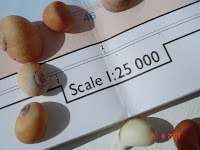 CONFUSION WORSE CONFOUNDED
CONFUSION WORSE CONFOUNDEDAlthough I was brought up in a world of 'One Inch to One Mile' maps I saw very early the advantages of metrication (especially in regard to the elementary school syllabus!). At the age of seven I wrote an essay calling upon the transport authorities to change traffic to the right-hand lane, and to measure distances in kilometres. As usual, my advice was ignored, and what would have been perfectly feasible in the primitive road system of the 1930s has now become impossible. One blenches at the thought of re-orienting Spaghetti Junction.
Still, it would not be beyond practicality to replace miles by kilometres - it would cause no more chaos than arose from metricating market stalls, for instance. Not that old habits don't die hard; some vendors as well as customers seem to find adding up in tens an insuperable problem. I find it particularly annoying when one asks if a particular steak weighs more than 200g to be told 'bout arf-pound'.
But we are stuck with imperial tatters of measurement of distance, and the Ordnance Survey try to fob us off with the feeble information that the map in the picture above is 'about 2 1/2 inches to the mile'. Only the Irish, bless them, seem to have grasped the problem in a typically Gaelic way, by showing distance between towns in kilometres, but fining you if you break the speed limit in mph.
So, if the kilometre is to be accepted all over Europe except here, can we at least get the language right?
Repeat after me: "We measure weights in kilograms [KILL-ograms].
We measure frequency in kilocycles [KILL-ocycles].
We measure power in kilowatts [KILL-owatts].
And we measure road distances in kilometres [KILL- ometres]."
Not, please note, in kil-OMM-etrs, any more than we buy food in kil-OGG-rms, or measure frequencies in kil-OSS-icles, or........
Where this particular illiteracy has come from I don't know, but it has all the hallmarks of nerdy general ignorance one has come to expect from technical experts on the other side of the Atlantic. It has no purpose but to sound trendy, and merely serves to further complicate an issue which, technically and linguistically, is confused enough already.